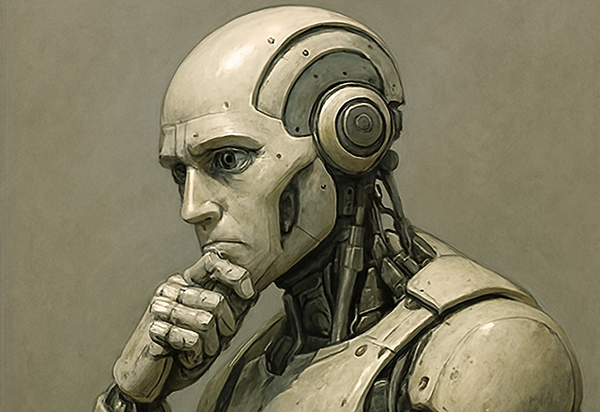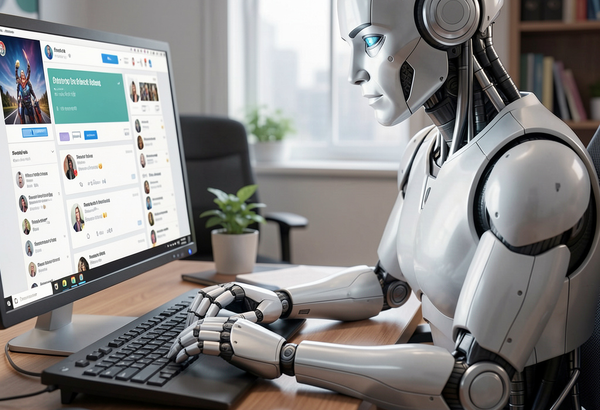OpenAI's new browser is just a small part of a much bigger plan
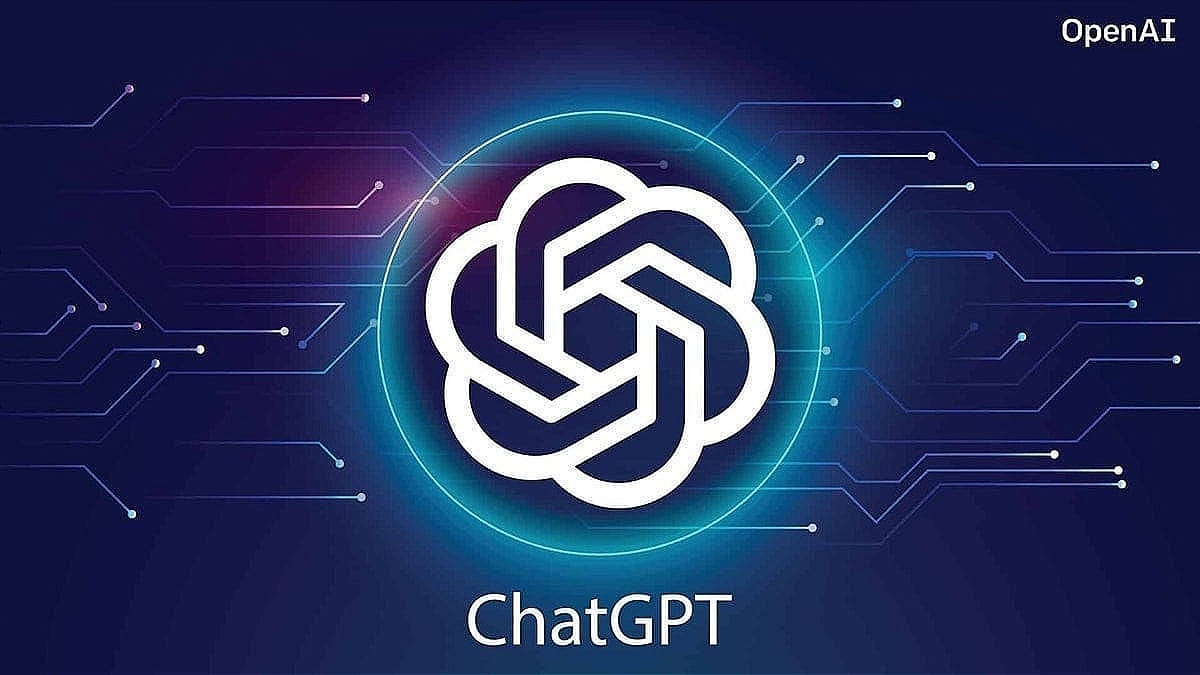
It's a truism – at least in my experience – that the coverage of new product launches often seems to focus on the minutiae of a product. With Apple's new phones, for example, it's about how rounded the corners are or how big the bezel is, how many camera bumps it has, and that sort of thing. In part this is because new products are just that — new — and so many journalists likely haven't had had time to take whatever it is out for a real spin, and in part it's because in a mature category like smartphones there's literally nothing else to talk about. But it's also because a lot of tech journalists tend to be hard-core geeks, and they (and their gadget-obsessed audience) love to pore over tiny details and go down rabbit holes. True to form, there was a lot of this in the coverage of OpenAI's new ChatGPT-powered browser Atlas — the UI of the opening screen, the nuances of the layout, how a user accesses the browser's extensions, and so on. All of this is as it should be, but none of that is what interests me about OpenAI's browser.
Just to recap, OpenAI launched the browser on Tuesday. Under the hood, the browser is Chromium, the open-source version of Google's Chrome browser, which the company released for anyone to use in 2008 (interesting fact: Google also developed the "transformer" software that would eventually become the foundation for GPT — generative pre-trained transformer — engines like ChatGPT). Chromium is also the foundation of most other non-Google browsers, including DuckDuckGo, and Microsoft Edge. It's also worth noting that there are two other Chromium-based browsers that have AI aspects built into them: Perplexity has a browser that it calls Comet, and The Browser Company has one called Dia whose motto is "chat with your tabs." With no disrespect implied to these other products, I think it's fair to say that they have had very little pickup in either the broader tech community or the world of "civilians," as I used to refer to non-tech-obsessed people. Deservedly or not, OpenAI is the Microsoft or Google of the AI market, based not just on media coverage but actual users: ChatGPT has about 700 million, and is one of the fastest growing apps of all time.
So is Atlas the first AI-powered browser, or the first browser with AI features? No. But it is likely to be the only one with the kind of name recognition that might get civilians to download it and possibly even use it. Of course, any such discussion has to start with the reality that many people aren't even aware that there are different browsers — they use the one that came with their computer, whether it's Safari or Edge, and that's that. Even if they have heard of Chrome, they probably aren't going to download it, or try to figure out how to import their bookmarks or tabs or whatever. And the vast majority of people will never have heard of Firefox, let alone Arc or any of the other alternative browsers that are out there. They may not even be aware of what the word "browser" refers to. I have a vivid memory of trying to explain to my mother-in-law the difference between the little box that you type a URL into and the little box that you type into when you want to search. So if OpenAI is targeting this broader market, good luck to them.

Not to go too far down the rabbit hole, but there's no question the web browser market has been ripe for disruption. Google launched Chrome in 2008, which is so long ago that it almost qualifies as a different century in tech terms. The launch came a year after Twitter launched, and two years after Facebook, and those two apps are almost unrecognizeable now. The first iPhone was released the year before Chrome. In 2008, OpenAI co-founder and CEO Sam Altman was 22. Google, of course, launched its own browser in an attempt to take on Microsoft, the dominant software company of the time, and its leading Microsoft Explorer web browser. Before long, Chrome was the market leader and Explorer was eventually discontinued and replaced by Edge – which, it should be noted, has Microsoft's Copilot AI sort of baked into it. (Microsoft partnered with and invested in OpenAI but there are signs that the partnership is getting a little strained). Chrome also has some integration with Gemini.
As Casey Newton wrote in his Platformer newsletter, Chrome definitely has AI features, but can you name them? And if you can name them, can you find them? The browser's Gemini in Chrome feature, which lets you chat with tabs in much the same way as you can in Atlas and other AI browsers, "feels tentative and tacked on compared to its rivals," Newton wrote. Atlas' big move, he says, is to surround every page with ChatGPT — your past chats and various tools in the left sidebar, an open chat in the right sidebar, and an agent that will take over the browser for you and attempt to get things done. Reed Albergotti, who writes a tech newsletter for Semafor, noted that "the promise of the AI-powered web browser is a tantalizing one: Imagine every annoying thing you do on the web is done for you. And it kind of works!" But not in every case, he said — browsers like Comet work well with well-designed websites, but often do less well navigating sites that are either old or poorly architected (like Semafor's travel-expense website).
Note: In case you are a first-time reader, or you forgot that you signed up for this newsletter, this is The Torment Nexus. You can find out more about me and this newsletter in this post. This newsletter survives solely on your contributions, so please sign up for a paying subscription or visit my Patreon, which you can find here. I also publish a daily email newsletter of odd or interesting links called When The Going Gets Weird, which is here.
Browsers are a sideshow
Before I move on, I feel I should also mention an important way in which an AI-powered browser can be significantly different – and potentially much worse -- than a traditional browser. Since browsers like Atlas and Comet are running on an AI engine and have semi-autonomous "agents" built in (to scour websites for prices and order things or book travel, etc), they are susceptible to being hijacked by what's called a "prompt injection attack," where a website could take control of the agent and cause it to do all kinds of unpleasant things. Simon Willison wrote that the security and privacy risks involved with using Atlas "still feel insurmountably high to me — I certainly won't be trusting any of these products until a bunch of security researchers have given them a very thorough beating." Willison said he would like to see "a deep explanation of the steps Atlas takes to avoid prompt injection attacks. Right now it looks like the main defense is expecting the user to carefully watch what agent mode is doing at all times!"
I should also note that one of the benefits of having a web browser, if you are an AI company, is that all of the things that a user types into the search/chat box, and all of the places they go or sites they visit become data that your AI engine can use to tailor experiences and agent-driven services to that user's desires or interests — and also become fodder for the AI's development and training as well. Obviously for some people this is a controversial part of what AI does, although I personally am not troubled by it. For what it's worth, OpenAI says that hoovering up a user's data is off by default in Atlas, but users can turn it on if they wish. There is also an "incognito mode," as there is with Chrome and other browsers, where a user effectively becomes anonymous to the browser (at least theoretically) and users can log out of ChatGPT as well.
This is all interesting enough, but for me at least the whole "browser war" thing is a bit of a sideshow. Yes, the web browser market is important, but I would argue that it is mostly useful as a stepping stone — tech analyst Benedict Evans called it a "distribution move not a user experience move," and I think he's right in that owning the browser experience is unlikely to be OpenAI's end game. I have no inside knowledge of their battle plans, but if they are planning to stop with a web browser I would be very surprised. I think the browser offering -- along with other news such as the integration with retailers like Walmart — is just another step in a bid for world domination of a sort. In other words, I think the real end game is to either release a ChatGPT-powered operating system, or at the very least to integrate its technology into every app and software or service, to the point where web browsers and even operating systems are irrelevant.
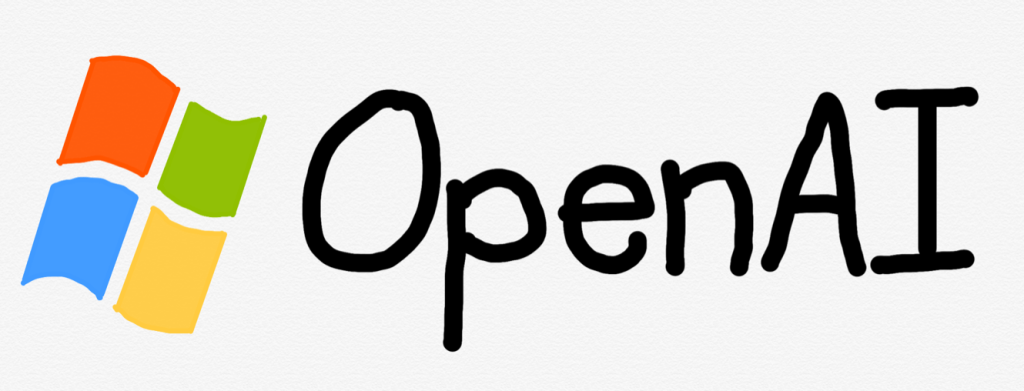
I started thinking about this more deeply when I read something that tech analyst Ben Thompson wrote in his newsletter Stratechery a few weeks ago, when he described what he called "OpenAI's Windows play." Thompson said he came to his conclusions after seeing some of the string of multibillion-dollar announcements that have been coming out of OpenAI, including data-center buildout partnership with Oracle, an investment from chip-maker Nvidia, an Instant Checkout feature, a partnership with Samsung for memory chips, the launch of the Sora 2.0 model and a related app, and the announcement of a number of developer-focused projects, including integration for other apps within ChatGPT, and API access to various parts of OpenAI's products. Here's Thompson:
For nearly two decades smartphones, and in particular iOS, have been the touchstones in terms of discussing platforms. It’s important to note, however, that while Apple’s strategy of integrating hardware and software was immensely profitable, it entailed leaving the door open for a competing platform to emerge. The challenge of being a hardware company is that by virtue of needing to actually create devices you can’t serve everyone; Apple in particular didn’t have the capacity or desire to go downmarket, which created the opportunity for Android to not only establish a competing platform but to actually significantly exceed iOS in market share. That means that if we want a historical analogy for total platform dominance — which increasingly appears to be OpenAI’s goal — we have to go back further to the PC era and Windows.
Wanted: One Trojan horse
As Thompson notes, there is no entity in the current technology marketplace that is the equivalent of IBM when Microsoft launched the MS-DOS operating system (based on software they bought from another company) and created what became a generational computing empire that lasted for more than 40 years. So there's no direct comparison for how Windows became the foundational desktop operating system. Today, Thompson argues — in the age of the ubiquitous consumer and social internet — the route to dominance is to become popular with users (and developers) rather than by buying one's way into a monopoly. In OpenAI's marketing for its app integrations, it said that it wanted to "integrate with the rest of the web," but Thompson said he disagreed:
It’s fair to wonder if these app experiences will measure up to these company’s self-built apps or websites, just as there are questions about just how well the company’s Instant Checkout will convert; what is notable, however, is that I disagree that this represents a “push to integrate…with the rest of the web”. This is the opposite: this is a push to make ChatGPT the operating system of the future. Apps won’t be on your phone or in a browser; they’ll be in ChatGPT, and if they aren’t, they simply will not exist for ChatGPT users. That, by extension, means the burden of making these integrations work — and those conversions performant — will be on third party developers, not OpenAI. This is the power that comes from owning users, and OpenAI is flexing that power in a major way.
OpenAI's deals with chipmakers Nvidia and AMD, Thompson argues, are the equivalent of Microsoft's partnership with Intel, which created the duopoly known colloquially as Wintel. Relying on Intel created a number of weaknesses and stress points for Microsoft, Thompson says, which OpenAI is trying to avoid by partnering with multiple players. But the goal is the same: to control the entire AI ecosystem — or as much of it as possible — from the chips inside the servers and the data center where the servers reside to the software that users rely on to accomplish various tasks, all of which OpenAI would like to see have ChatGPT or Sora-style functions built into them. In a way, domination is harder for OpenAI than it was for Microsoft because Microsoft got IBM and its PCs to be a Trojan horse that got Windows into millions of households, and once it got its hooks into them it was almost impossible to remove.
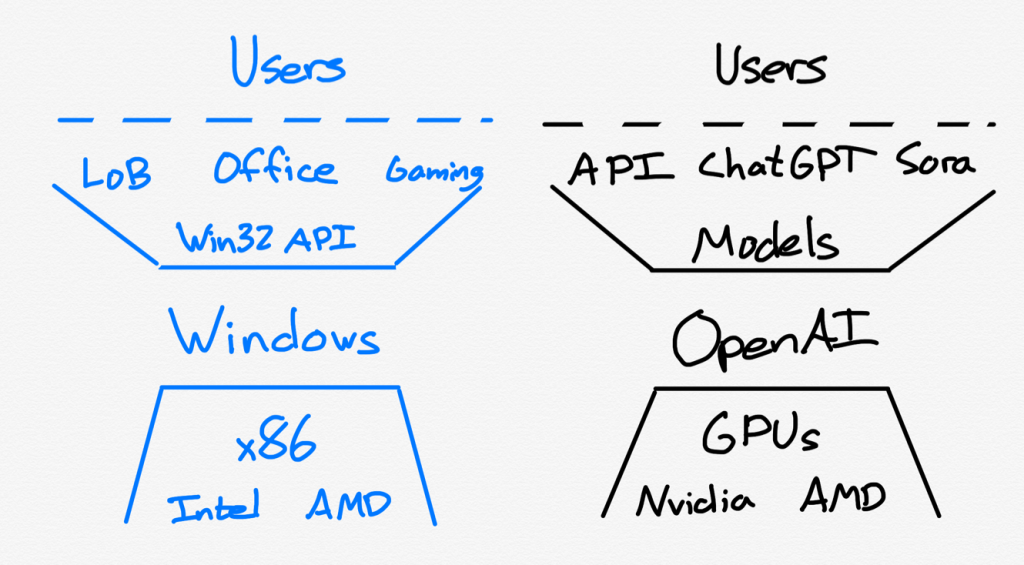
Thompson seems to be suggesting by the above graphic that OpenAI doesn't need to build its own operating system — it can effectively become an operating system if it is integrated into enough apps and services and pieces of hardware, whether it's desktops or phones or smart glasses (which seem to be making a comeback, as I wrote recently for The Torment Nexus). If the blizzard of deals that OpenAI has been making with everyone from Oracle and Nvidia to AMD and Walmart seem a little on the desperate side (or evidence that the AI market is in a bubble, which I also wrote about recently) it could be because the company believes it has to move quickly if it is going to grab the opportunity that awaits it: to become the Windows of AI. In effect, it has to coerce or entice or strongarm enough big partners to join — or at least power — its march towards this goal. In the future that OpenAI is banking on, I think, operating systems will become even more irrelevant than they are already, and will be just the substrate on which AI operates.
Not everyone is excited by this prospect, of course. Enrique Dans wrote at Fast Company that OpenAI is trying to duplicate the monopolistic playbook pioneered by platform companies like Facebook: "By embedding itself as the interface to other apps, it ensures that even if competitors exist, they’ll have to go through its ecosystem to reach users," he writes. "It’s the classic Silicon Valley playbook, executed with breathtaking speed and a layer of AI pixie dust. Altman learned from the best. He watched Apple, Google, and Facebook turn control of interfaces into control of economies. Now he’s applying the lesson to the age of agents: Own the conversation, and you own the user." Will OpenAI take a different path — a more open path — than its predecessors, or will the new boss be more or less the same as the old boss? That remains to be seen.
Got any thoughts or comments? Feel free to either leave them here, or post them on Substack or on my website, or you can also reach me on Twitter, Threads, BlueSky or Mastodon. And thanks for being a reader.

